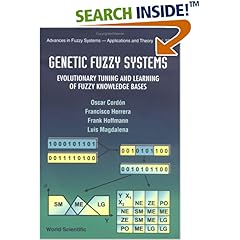Washington, D.C., USA, June 25, 2005. To be held during the Genetic and Evolutionary Computation Conference (GECCO-2005), June 25-29, 2005.
Since Learning Classifier Systems (LCSs) were introduced by Holland as a way of applying evolutionary computation to machine learning problems, the LCS paradigm has broadened greatly into a framework encompassing many representations, rule discovery mechanisms, and credit assignment schemes. Current LCS applications range from data mining to automated innovation to on-line control. Classifier systems are currently enjoying a renaissance, with newer approaches, in particular Wilson’s accuracy-based XCS, receiving a great deal of attention. LCS are also benefiting from advances in the field of reinforcement learning, and there is a trend toward developing connections between the two areas.
We invite submissions which discuss recent developments in all areas of research on, and applications of, Learning Classifier Systems.
IWLCS is the only event to bring together most of the core researchers in classifier systems. Two free tutorials on LCS will be presented at GECCO 2005: an introductory tutorial on LCS in general and an advanced tutorial on XCS.
Special Session on Challenges for the Field
What are the key challenges, issues, limitations, technologies and directions for LCS research? We plan a special session consisting of 5 minute presentations on challenges for the field and how to solve them. If interested, please send your name and title of your presentation to the organisers by April 10, 2005.
Submissions
Accepted papers will appear in the GECCO 2005 workshop volume distributed at the conference, and, as in previous years, we intend to publish selected papers in a post-workshop proceedings in Springer’s LNAI series.
There are two possibilities for paper submissions. Short papers of up to 4 pages may be submitted. Short papers will be peer reviewed and those accepted will be presented at the workshop. After the workshop the authors will have to submit full papers which are reviewed again for the post-workshop proceedings.
Alternatively, full papers of up to 20 pages may be submitted for peer review before the workshop. All accepted full papers will be presented at the workshop and will be published in the post-workshop proceedings.
All papers should be in LNAI format. A PDF file containing the paper should be e-mailed to iwlcs@cas.dis.titech.ac.jp by the 10th of April 2005.
Camera ready for GECCO’2005 workshop proceedings
Accepted short papers will be published in the GECCO workshop book. Authors of long papers have a choice: either i) prepare a short version for GECCO or ii) send them only your abstract for the GECCO book. If you prefer i) I would suggest an extended abstract of 1 or 2 pages, but anything up to 75% of the full paper is ok.
All papers need to be format following the ACM camera-ready directives of all accepted workshop papers should be submitted by April 26 for their inclusion in the GECCO 2005 workshop proceedings. It is important to note that those papers needs to be format following ACM directives. Further instructions for the preparation of the workshop papers can be found at http://www.sheridanprinting.com/typedept/gecco1.htm.
Remember to include the proper ACM conference information
\conferenceinfo{GECCO'05,} {June 25--29, 2005, Washington, DC, USA.}
\CopyrightYear{2005}
\crdata{1-59593-097-3/05/0006}
Important dates
- Paper submission deadline: April 10, 2005 (Deadline extended)
- Decisions: April 21, 2005
- GECCO 2005 Workshop proceedings camerar-ready: April 26, 2005
- Workshop: June 25, 2005
Organization
Organizing Commitee
- Tim Kovacs, University of Bristol
- Xavier Llorà, University of Illinois at Urbana-Champaign,
- Keiki Takadama, Tokyo Institute of Technology
Advisory Committee
- Pier Luca Lanzi, Politechnico de Milano
- Wolfgang Stolzmann, DaimlerChrysler AG, Berlin
- Stewart Wilson, Prediction Dynamics, Concord. MA
Program Committee
- Alwyn Barry,University of Bath
- Andrea Bonarini, Politecnico di MIlano
- Lashon Booker, The MITRE Corporation
- Will Browne, The University of Reading
- Larry Bull, University of West England
- Martin Butz, University of Wuerzburg
- Rob Egginton, University of Bristol
- Pierre Gérard, University of Paris 13
- John Holmes, University of Pennsylvania School of Medicine
- Jacob Hurst, University of West England
- Sonia Schulenburg, Napier University
- Olivier Sigaud, University of Paris 6
- Jaume Bacardit, University of Nottingham
- Ester Bernadó-Mansilla, Ramon Llull University
- Luis Miramontes Hercog
- Christopher Stone, University of the West of England
- Atsushi Wada, ATR Network Informatic Laboratories
For further information please contact iwlcs@cas.dis.titech.ac.jp.







